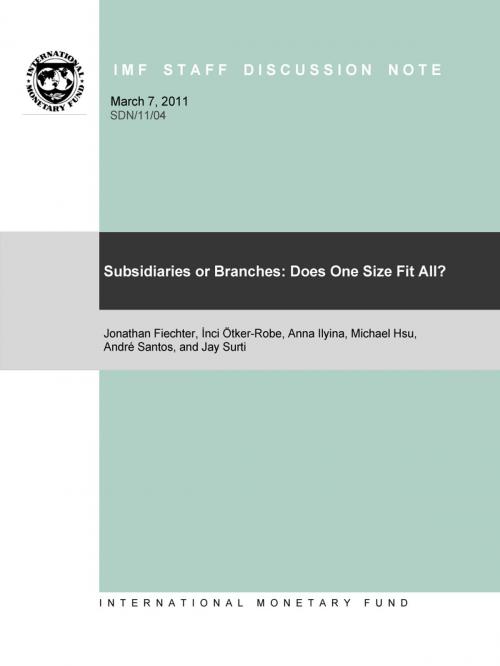Subsidiaries or Branches: Does One Size Fit All?
Business & Finance, Economics, Money & Monetary Policy, Macroeconomics| Author: | Jonathan Fiechter, Inci Ms. Ötker, Anna Ilyina, Michael Hsu, Andre Mr. Santos, Jay Surti | ISBN: | 9781462302123 |
| Publisher: | INTERNATIONAL MONETARY FUND | Publication: | March 1, 2011 |
| Imprint: | INTERNATIONAL MONETARY FUND | Language: | English |
| Author: | Jonathan Fiechter, Inci Ms. Ötker, Anna Ilyina, Michael Hsu, Andre Mr. Santos, Jay Surti |
| ISBN: | 9781462302123 |
| Publisher: | INTERNATIONAL MONETARY FUND |
| Publication: | March 1, 2011 |
| Imprint: | INTERNATIONAL MONETARY FUND |
| Language: | English |
This study proposes to make an assessment of the trade-offs emanating from the adoption of the stand-alone subsidiarization (SAS) model of global banking. In the aftermath of the global financial crisis, the United Kingdom Financial Services Authority (FSA) proposed SAS as a possible practical avenue to lessen risk of contagion of macro-financial problems by re-organizing internationally active banks into financially self-sufficient, independently management constellations. While SAS exerts a potential stabilizing influence on global financial markets by containing financial sector dislocation at its point of origin, its costs—in terms of potential decrease in global capital flows, a discrete change in financial institutions’ business models and returns, and risk management capacity of globally active institutions—may be substantial. The paper will assess the distribution of these benefits and costs across various stakeholders—home and host countries and the financial institutions—at different points in the business cycle. It will also examine whether some intermediate solutions recently proposed by the Fund provide a more practical way forward in view of the cost-benefit analysis of SAS.
This study proposes to make an assessment of the trade-offs emanating from the adoption of the stand-alone subsidiarization (SAS) model of global banking. In the aftermath of the global financial crisis, the United Kingdom Financial Services Authority (FSA) proposed SAS as a possible practical avenue to lessen risk of contagion of macro-financial problems by re-organizing internationally active banks into financially self-sufficient, independently management constellations. While SAS exerts a potential stabilizing influence on global financial markets by containing financial sector dislocation at its point of origin, its costs—in terms of potential decrease in global capital flows, a discrete change in financial institutions’ business models and returns, and risk management capacity of globally active institutions—may be substantial. The paper will assess the distribution of these benefits and costs across various stakeholders—home and host countries and the financial institutions—at different points in the business cycle. It will also examine whether some intermediate solutions recently proposed by the Fund provide a more practical way forward in view of the cost-benefit analysis of SAS.















